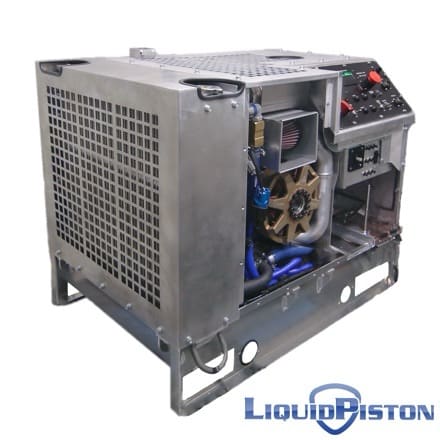BLOOMFIELD, Conn. — September 23, 2024 —LiquidPiston, Inc., a leading innovator of efficient internal combustion engine technology and hybrid power systems, today announced that it has begun testing its 10kW heavy-fueled generator prototype.

The genset is powered by LiquidPiston’s 25hp heavy-fueled XTS-210 rotary engine, which itself entered its integrated engine testing phase in April 2024.
The company has been awarded over $65 million in Department of Defense (DoD) contracts, including an $8.3 million development contractwith the U.S. Army, in 2023, to develop a lightweight and ultra-portable generator for the military. The 10kW generator prototype now being tested is meant to address DoD priorities for a smaller footprint and increased portability.
“This is an exciting time for the LiquidPiston team as we begin testing the fully integrated generator prototype, which we will continue to refine ahead of delivering it to our DoD customers,” said LiquidPiston co-founder and CEO, Alec Shkolnik. “Our goal is to help address the DoD’s demanding operational energy needs with significantly smaller and lighter portable power generation systems.”
The LiquidPiston 10kW genset is designed specifically to meet the DoD’s portable electric genset specs at approximately one-quarter the size and weight of the U.S. Army’s current Advanced Medium Mobile Power Source (AMMPS) 10kW generator system.
The 10kW system incorporates all components required for reliable and efficient power production in the field, including the XTS-210 rotary engine, a high-performance electric motor/generator, custom power electronics, controls, a thermal management system, a fuel tank, muffling, and military-grade packaging. The generator is designed in the long term to be plug-and-play compatible with today’s AMMPS systems, and it will have similar connectivity and interoperability.
Being smaller and lighter than the DoD’s currently-deployed 5kW and 10kW gensets, and approximately the same size as the currently deployed 3kW genset, LiquidPiston’s 10kW genset could greatly simplify DoD generator procurement and logistics by potentially replacing three products with a single product.
While being developed initially with an eye on military specifications, the base generator technology can be applied commercially in applications operating on heavy fuels including diesel, kerosene, and jet fuel, or can be configured to be multi-fuel capable, compatible with gasoline and gaseous fuels like propane.
The 10kW genset leverages the XTS-210 engine’s patented High Efficiency Hybrid Thermodynamic Cycle™ (HEHC) design, offering several key benefits over current generator technology:
• Lightweight –
Up to 75 percent lighter and smaller than the currently-fielded AMMPS.
• Easy to transport –
Can be man-portable, instead of requiring a truck, trailer, or forklift.
• Space efficient –
Occupies only ~9 cubic feet of space.
• Heavy- and multi- fuel capable –
Designed for jet fuel, the engines have also been operated on gasoline, diesel, propane, and hydrogen.
LiquidPiston’s XTS-210 heavy-fueled rotary engine is the result of significant internal research and development, coupled with more than ten contracts secured with the U.S. Department of Defense and over $20 million awarded in development funding, including a $9 million DEVCOM Army Research Laboratory award for a Compact Efficient Rotary Engine announced in November 2022. The XTS-210 is also being integrated into a hybrid eVTOL UAS for a U.S. Army demonstration that will occur later this year.
LiquidPiston has previously raised over $50M in equity crowdfunding, and is currently running a Reg CF equity crowdfunding campaign which is scheduled to close September 27, 2024.


Been following these guys for a decade. This technology will be a game changer. I hope testing is flawless and we get these things in the hands of the warfighter.
So, How long is the testing period? Any Updates?